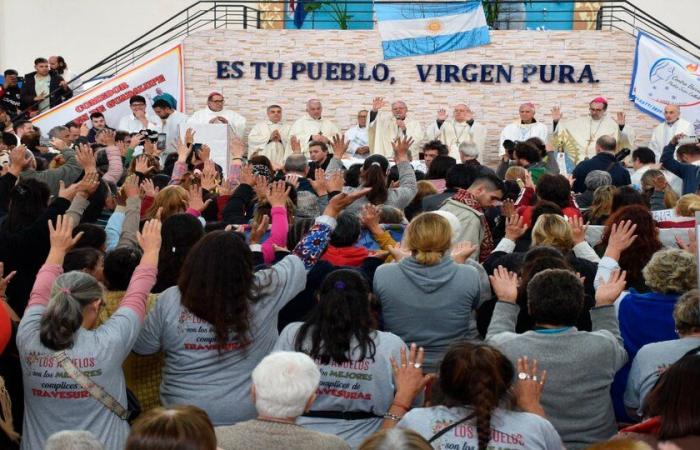
After the scandal over the lack of distribution of tons of food collected by the Ministry of Human Capital, the president of the Argentine Episcopal Conference, Monsignor Oscar Ojea, led a mass to honor the women who work in community kitchens throughout the country. in the Sanctuary of the Virgin of Caacupé and San Blas de La Matanza, and demanded from the Government a national food plan that ensures the arrival of food to all families.
“We are on time, there is so much to do, so much to work on, everyone has to look at their responsibility. Our women meet these boys and girls, and sometimes they also meet adults,” Ojea described the critical moment that is being experienced. in the popular neighborhoods and thanked the work of the women, particularly the cooks, in the soup kitchens; whose hands she blessed.
The head of the Episcopal Conference recalled the fundamental role of these women when recounting his own experience as a parish priest in a boys’ home. “To find out how each boy was doing, we asked the cook. Because that woman who served the food knew what was happening to him. She knew if he was sick, sad or happy. She knew if he missed his mother. The women who work this way , in our neighborhoods, with the heart of a mother, they are not only mothers of their children,” he said.
The mass held in La Matanza is another message from the Church to the food policy of Javier Milei’s government, which fired the Secretary of Children, Adolescents and Family, Pablo De la Torre, but still supports Minister Sandra Pettovello and describes her as “the biggest thing there is.” In the days in which the presence of 5 tons of undistributed food in warehouses in Buenos Aires and Tucumán was discovered, Ojea had already expressed himself in harsh terms.
“I don’t go into the reasons why they are stored, but I think that in a time of food emergency this should call us to reflection,” Ojea told the Government in the days when federal judge Sebastián Casanello ordered Pettovello to present a plan of food distribution; which began to be carried out with the help of the Army and the CONIN Foundation, heading to friendly provinces.
Before the social leader Juan Grabois presented the demand for the food collection, the Episcopal Conference had already warned about the food situation in the neighborhoods and the adjustment policy of the Milei government. In February, a statement signed by Ojea maintained that “in our homeland no one should go hungry, since it is a blessed land of bread” and warned that “however, today, hundreds of thousands of families find it increasingly difficult to do so.” difficult to eat well.”
The mass of tribute to the cooks who “fed hundreds of thousands of people during the pandemic and who today are in charge of all the community kitchens,” highlighted the Episcopal Conference, brought together the ecclesiastical authorities of the Buenos Aires suburbs, the vicar general of the archdiocese of Buenos Aires and more than 40 priests from the Team of priests who live and work in the towns and popular neighborhoods of the City of Buenos Aires and the Buenos Aires suburbs.
At the end of the mass, Monsignor Ojea blessed the hands and lives of the cooks and gave them, as a “symbol of unity and brotherhood”, a band with the colors of the Argentine flag. The masses in demand of the right to food in the country are repeated in other parts of the country such as in La Banda, Santiago del Estero, led by Father José María “Pepe” Di Paola, or in the City of Córdoba, celebrated by the Cardinal Ángel Rossi; and in Mar del Plata, chaired by Monsignor Ernesto Giobando.
“There is so much confusion in many situations in our neighborhoods that sometimes people get angry and come angry to ask for food. We don’t just see it in our neighborhoods, we also see it with people who are homeless. The other day a man told me who works during the night traveling around the city to feed: ‘Father, they are taking my food, now they are taking my food, they are not waiting for me,'” Ojea described.
The message of the Church was expanded to other responsibilities of the State by the bishop of San Justo, Monsignor Eduardo García, during the mass in the Church of Caacupé when remembering the situation of neighborhoods such as those of La Matanza, “where more than once “We have been punished for forgetfulness, for the absence of the State, for the lack of education and sewers, or decent housing, sometimes also punished by the media that does not forgive growth and advancement as a people.”





